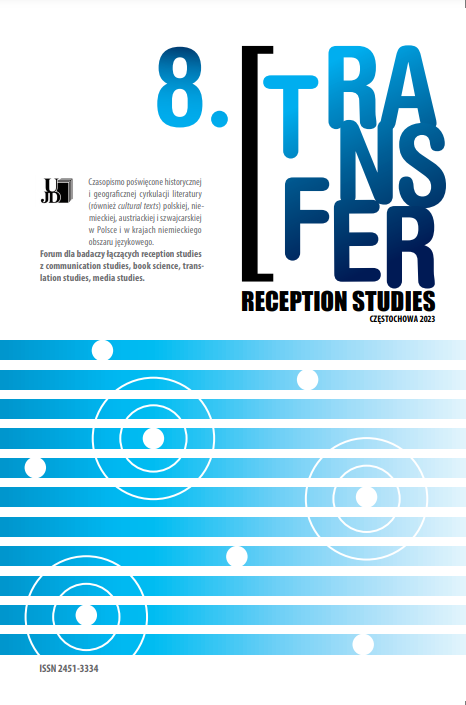The Ironical Mode in the Contemporary Romance Novel
Abstract
The ironical mode is a complex of literary, especially structural, metafictional, in-tertextual, distancing, and illusion-breaking methods that are used in contemporary German romance novels. A relativistic notion of love as cultural construct underlies this formal organ-ization. In the paper the ironical mode is opposed with the utopian mode, and questions con-cerning its efficacy in the contemporary German literature are posed. Romance novels by Wolf Haas, Monique Schwitter, Christoph Höhtker, Peter Handke, Martin Walser, Friedrich Christian Delius, Navid Kermani, Brigitte Kronauer, Olga Flor, Elfriede Jelinek, Sibylle Berg, Marlene Streeruwitz and Corinna T. Sievers are approached.
Keywords:
romance novel, love, irony, contemporary German literatureReferences
References
Berg, Sibylle. Der Tag, als meine Frau einen Mann fand. München: Hanser, 2015. Google Scholar
Bourdieu, Pierre. Die Regeln der Kunst. Genese und Struktur des literarischen Feldes. Tranlated by Bernd Schwibs and Achim Russer. Frankfurt am Main: Suhrkamp, 1999. Google Scholar
Delius, Friedrich Christian. Die Frau, für die ich den Computer erfand. Reinbek b. Hamburg: Rowohlt, 2011. Google Scholar
Finch, Helen. “Elfriede Jelinek’s Gier (Greed).” In The Novel in German since 1990, edited by Stuart Taberner, 151–164. Cambridge: Cambridge University Press, 2011, https://doi.org/10.1017/CBO9780511667558. Google Scholar
Flor, Olga. Klartraum. Salzburg: Jung und Jung, 2017. Google Scholar
Haas, Wolf. Das Wetter vor 15 Jahren. München: Deutscher Taschenbuch Verlag, 2014. Google Scholar
Haas, Wolf. Verteidigung der Missionarsstellung. München: Deutscher Taschenbuch Verlag, 2014. Google Scholar
Han, Byung-Chul. Agonie des Eros. Berlin: Matthes & Seitz, 2017. Google Scholar
Han, Byung-Chul. Transparenzgesellschaft. Berlin: Matthes & Seitz, 2012. E-Book. Google Scholar
Hettche, Thomas. “Die neue Keuschheit der Pornographie.” Frankfurter Allgemeine Zeitung, Nr. 17 (21.01.2003): 38. Google Scholar
Illouz, Eva. Der Konsum der Romantik. Liebe und die kulturellen Widersprüche des Kapitalismus. Translated by Andreas Wirthensohn. Frankfurt am Main: Suhrkamp, 2007. Google Scholar
Illouz, Eva. The End of Love. A Sociology of Negative Relations. New York: Oxford University Press, 2019. E-Book. Google Scholar
Illouz, Eva. Warum Liebe weh tut. Eine soziologische Erklärung. Translated by Michael Adrian. Berlin: Suhrkamp, 2011. Google Scholar
Kermani, Navid. Große Liebe. München: Hanser, 2014. Google Scholar
Kronauer, Brigitte. Der Scheik von Aachen. München: Deutscher Taschenbuch Verlag, 2019. Google Scholar
Lachmann, Renate. Erzählte Phantastik. Zu Phantasiegeschichte und Semantik phantastischer Texte. Frankfurt am Main: Suhrkamp, 2002. Google Scholar
Lepape, Pierre. Une histoire des romans d’amour. Paris: Seuil, 2011. Google Scholar
Luhmann, Niklas. Liebe als Passion. Zur Codierung von Intimität. Frankfurt am Main: Suhrkamp, 2015. Google Scholar
Morikawa, Takemitsu. “Gibt es ein Weltfunktionssystem für Intimbeziehungen? Jenseits des Spannungsverhältnisses von Kulturalismus und Westzentrismus.” In Liebesgeschichte(n). Identität und Diversität vom 18. bis zum 21. Jahrhundert, edited by Frank Becker and Elke Reinhardt-Becker, 331–360. Frankfurt am Main: Campus, 2019. Google Scholar
Neuhaus, Stefan. “Paarbildungen. Figurationen der Liebe in Gegenwartsliteratur und -film.” In Figurationen der Liebe in Geschichte und Gegenwart, Kultur und Gesellschaft, edited by Stefan Neuhaus, 273–292. Würzburg: Königshausen & Neumann, 2012. Google Scholar
Pearce, Lynne. Romance Writing. Cambridge: Polity Press, 2007. Google Scholar
Rauen, Christoph. Pop und Ironie. Popdiskurs und Popliteratur um 1980 und 2000. Berlin – New York: De Gruyter, 2010. Google Scholar
Rorty, Richard. Contingency, irony, and solidarity. Cambridge: Cambridge University Press, 1993, https://doi.org/10.1017/CBO9780511804397. Google Scholar
Schwitter, Monique. Eins im Andern. Frankfurt am Main: Fischer, 2017. Google Scholar
Sievers, Corinna T.. Vor der Flut. Frankfurt am Main: Frankfurter Verlagsanstalt, 2019. E-Book. Google Scholar
Szczepaniak, Monika. “Coole Romanze als literarisches Programm.” In Liebesgeschichte(n). Identität und Diversität vom 18. bis zum 21. Jahrhundert, edited by Frank Becker and Elke Reinhardt-Becker, 151–169. Frankfurt am Main: Campus, 2019. Google Scholar
Tommek, Heribert. Der lange Weg in die Gegenwartsliteratur. Studien zur Geschichte des literarischen Feldes in Deutschland von 1960 bis 2000. Berlin – New York: De Gruyter, 2015. Google Scholar
Authors
Rafał Pokrywkarafalpok@o2.pl
Poland
https://orcid.org/0000-0002-5510-9412
Rafał Pokrywka, PhD in literary studies, currently working at the Chair of Comparative Literature at Kazimierz Wielki University in Bydgoszcz, Poland. Relevant publications: Der Liebesroman im 21. Jahrhundert (The Romance Novel in the 21st Century, editor, 2017), Współczesna powieść niemieckojęzyczna (The Contemporary German Novel, author, 2018). E-mail: rafal.pokrywka@ukw.edu.pl
Statistics
Abstract views: 142PDF downloads: 118
Most read articles by the same author(s)
- Rafał POKRYWKA, Polish Reception of the German Romance Novel of the 21st Century , Transfer. Reception Studies: Vol. 1 (2016): CIRCULATION OF GERMAN-LANGUAGE AND POLISH LITERATURE IN THE XXI CENTURY
Similar Articles
- Joanna Ławnikowska-Koper, German-language literature in Switzerland without taboos , Transfer. Reception Studies: Vol. 5 (2020)
- Kamila ŁAPICKA, Polish voices about German history on the bases of two Polish productions of The Rock by Marius von Mayenburg , Transfer. Reception Studies: Vol. 3 (2018)
- Tobiasz Janikowski, "Will my tears change anything?” Manifestations of sadness in German music of the 18th century , Transfer. Reception Studies: Vol. 5 (2020)
- Gabriela JELITTO-PIECHULIK, Reception of Ricarda Huch's Work in Germany in 2014 during the Jubilee of the 150th Anniversary of the Author's Birth , Transfer. Reception Studies: Vol. 2 (2017)
- Jolanta Pacyniak, Narrative structures of threat in "1000 Coils of Fear" ("1000 Serpentinen Angst") by Olivia Wenzel , Transfer. Reception Studies: Vol. 8 (2023): Anxiety and fear in contemporary German-language, Polish and Irish literature
- Weiting Zhao, “Compassion”. The reception of Czesław Miłosz’s works in China , Transfer. Reception Studies: Vol. 5 (2020)
- Anna Bożena Badura, Staged Authenticity in Migrant Literature in Selected GermanLanguage Novels after 2015 , Transfer. Reception Studies: Vol. 4 (2019)
- Anna Szyndler, Tracing metaphysical longing through the works of Daniel Kehlmann , Transfer. Reception Studies: Vol. 7 (2022)
- Bernhard HARTMANN, Poesie, Lyrik, Dichtung or Gedichte? - Keywords in Poetic and Metapoetic Writing Tadeusz Różewicz in German Translation , Transfer. Reception Studies: Vol. 2 (2017)
- Anna SZYNDLER, The Polish Reception of Der Stellvertreter (1963) by Rolf Hochhuth , Transfer. Reception Studies: Vol. 1 (2016): CIRCULATION OF GERMAN-LANGUAGE AND POLISH LITERATURE IN THE XXI CENTURY
You may also start an advanced similarity search for this article.

